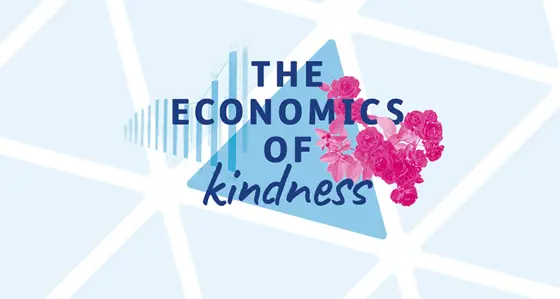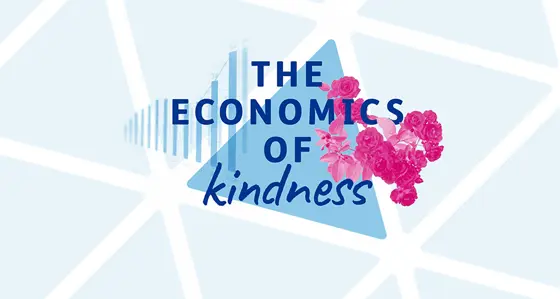Watch video: An introduction to the #EconomicsOfKindness.
"We define kindness as being honest, saying the hard truths and tackling the tough challenges head-on in order to create lasting, positive change, and better results."
What is kindness in business?
We believe that you create lasting impacts when you put people—customers, employees, investors, suppliers, and society—first.
What is kindness in business?
We believe that you create lasting impacts when you put people—customers, employees, investors, suppliers, and society—first.
Putting people first means being kind—ensuring everyone has a voice, being honest with customers and colleagues, saying the hard truths and tackling the tough challenges head on. That’s not the same as being nice, where you might avoid saying what you really think. Kindness is often the more difficult choice.
Being kind in business is a way to behave that creates better results. That’s because it helps build the trust needed at every stage to ensure the right things are done that create the positive impacts that last.
How does a business demonstrate kindness?
Businesses can demonstrate kindness to their employees, their customers, and the community.
How does a business demonstrate kindness?
Businesses can demonstrate kindness to their employees, their customers, and the community.
- Employees. Businesses demonstrate kindness through values and culture, leadership behaviours and training, on-boarding and expectations-setting, appraisals and communications.
- Customers. Businesses demonstrate kindness through mentoring and coaching, training and upskilling, inclusivity, and corporate social responsibility.
- Community. Businesses demonstrate kindness through corporate volunteering, funding, charity placements, work placements, and charity and strategic partnerships.
How can kindness help in business?
Kindness in business pays because it builds trust, productivity, employee retention, resilience, profitability, and brand loyalty.
How can kindness help in business?
Kindness in business pays because it builds trust, productivity, employee retention, resilience, profitability, and brand loyalty.
- Trust. Being kind means having the honest conversations with each other and this builds trust because there are no hidden agendas.
- Productivity. When people feel trusted, they are more likely to work better together and harder to achieve the same goal.
- Employee retention. Trusted people, working together as one, respected and valued for their views, creates happy people and teams who tend not to move companies. The average employee turnover rate in the UK is 16.4% and higher for management consultancies. Baringa’s attrition rate has never exceeded 10% in the last 5 years.
- Resilience. Teams that have honest conversations and who trust each other tend to be more resilient in times of difficulties.
- Profitability. Baringa’s research found that there is a powerful and legitimate correlation between businesses perceived to be kind and those with high EBITDA growth.
- Brand loyalty. Consumers vote with their wallets by choosing what they buy and who they spend with. Baringa’s research found that 61% of consumers have refused to buy a product or service in the last two years because they felt a company was unkind.
Read the introduction to our series on kindness and how it can help in businesses.
Expert view

Introducing the Economics of Kindness
At Baringa we’re convinced that, no matter the macroeconomic backdrop, kindness in business really does pay. That’s why we’re taking this opportunity to explore the economics of kindness across four pillars: people, business, leadership and investors.
Read more
People – planet – profit, in that order
The notion of a ‘triple’ bottom line – people first, then planet, then profit – is reshaping how organisations around the world do business. They’re bringing corporate kindness to the fore as we enter a new type of economy, and the businesses that organise themselves in this way will be the ones that succeed.
Read more
Redefining kindness in the workplace
Corporate kindness is all about the impact an organisation has on the world, engaging in responsible practices that benefit their customers, employees, and the communities they operate in.
Read more
Kindness can help you make decisions
Consumers vote with their wallets by choosing what they buy and who they spend with. Businesses can choose their suppliers, who they work with, and which markets they serve. Employees can choose who to work for and which career path to take.
Read more
Bringing kindness back to the top of the leadership agenda
Should kindness be back at the top of the leadership agenda? Managing Partner Adrian Bettridge discusses how when we lead with kindness, we generate lasting success for ourselves, our clients and our businesses.
Read more
Why corporate kindness makes good business sense
Traditional economics assumes the world has unlimited resources, but we live on a planet with fixed boundaries. There’s a growing awareness – undoubtedly accelerated by the climate crisis – of the negative externalities associated with economic activity, including waste, pollution, low wages, and unemployment.
Read more
If people are your greatest asset, kindness is key
Do kind cultures reap the benefits? For #WorldKindnessDay, Emma Pace, Baringa's Chief People Officer, discusses how kindness creates competitive advantage.
Read more
Governing with kindness: the transformative power of kindness in the public sector
Do government organisations need to prioritise kindness in order to deliver lasting impact for people and society? We explore how the principles of kindness can be applied to tackling public sector challenges.
Read more
Our Economics of Kindness journey: the story so far
What have we learned about kindness in business and in our public organisations? Does it pay? And if so, how?
Read moreBusiness view

Why being community-focused is essential for survival
Why wouldn’t businesses be community-focused? Especially if you consider your communities as customers? Andrew Reaney shares his personal experiences of why being community-focused is essential for survival
Read more
Building brands through kindness
Does employee welfare and personal happiness lead to increased productivity and profit? Baringa and Ella’s Kitchen discuss the role of kindness in its rapid growth and how companies can help overcome the rise in loneliness.
Read more
Clarity and self-accountability: the cornerstones of kind leadership
How do you break the circle of artificial harmony and of avoiding honesty? Leadership coach Jeremy Sweeney explores how to humanise organisations, the power of accountability, and whether kindness pays.
Read more
Kinship fuels growth – a view from technology businesses
What drives innovation and growth? Supportive comments or complete honesty? If you’re a high growth tech business, it’s kinship. Startup advisory Sapphire & Steel share their views on the economics of kindness.
Read more
How to balance kindness and profitability
We discuss why employers need to support their people beyond pay packet alone, the benefits of doing so, and the perils of short-term thinking.
Read more
The challenges of being a kind leader
In this conversation, Mike Lewis (previous CEO of E.ON) shares his experiences, what kindness means to him, and how being kind helped him navigate the most unprecedented challenge of recent history.
Read more
It’s not easy to be a kind leader
Can leaders be kind all of the time? What gets in the way? Ian Peters reflects on the challenges and trade-offs of trying to be kind to all stakeholders.
Read more
Investing in kindness
Do kind businesses make attractive investments? Ian Moore, partner at private equity firm CBPE Capital discusses the evolution of private equity and why kindness and culture are strong indicators of whether a business is worth investing in.
Read more
Making space and time for kindness
We discus how leaders need to make space for kindness and the challenges of being empathetic in a post-pandemic world.
Read more
Being a kind leader in times of uncertainty and transformation
Paul Rama of consumer healthcare company Haleon discusses how the blurring of lines between work and life has meant leaders need to be more aware of their teams and demonstrate greater levels of kindness to be effective.
Read moreConsumer view

Consumers confirm: kindness pays
To get the public's view on the economics of kindness, Baringa commissioned a global survey to understand how perceptions of kindness affect purchasing decisions.
Read more
Firms considered “kind” are more likely to be successful
Our research indicates that kindness isn’t simply a matter of ethics – it’s a no-nonsense business issue too. If your firm is considered “kind”, it is likely to have stronger growth than a firm considered unkind.
Read more
It’s the kind business leaders that are the successful ones
Our consumer research indicates that kindness is not simply a nice-to-have attribute—the public equate success in business leadership with kindness.
Read more
It’s the kind companies that attract the investment
Are kind companies attractive to investors? Baringa’s global research on the Economics of Kindness found that kindness influences where consumers choose to invest their money.
Read moreAcademic view

Is kindness authentic?
We talk to four leading commercial semioticians to understand more about kindness and what businesses should do about it.
Read more
The bank of goodwill
The bank of goodwill: kindness as a commodity? Anya Davis explores how kindness improves workplace relationships and how reciprocal kindness pays with behavioural psychologist Annie Hazlerigg.
Read more
Does kindness have a place in modern economics?
Dr Saite Lu, Mead Fellow and Director of Studies in Economics at Emmanuel College, Cambridge explores how economic thinking has changed through time and why it’s important to refocus on kindness.
Read more
The value of low-ego leadership
High-ego leaders get the headlines, but do they let others shine? Elsbeth Johnson, professor at MIT Sloan, explains how charisma and ego can get in the way.
Read moreOur Experts


